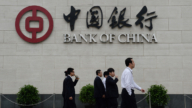【新唐人2011年12月31日訊】2011年底,世界對中國經濟的看法發生了很大的改變,現在討論最多的是,未來一年中,中國經濟能否成功實現軟著陸,還是徹底崩盤﹖許多外國企業也開始賣空中國資本,轉向其他國家。新一代中共領導人即將上任,他們能給中國經濟帶來生機嗎?
據經濟學家分析,由於美國經濟低迷,歐洲進一步陷入一場看似無休止的危機之中,外債收回的可能性非常渺茫,加上國內成本上升,出口也會隨之減少。長期的分配不公,內需也不會有太大的改善。然而最頭痛的還是中國的地方債務。
2008年,中共為了抑制金融危機,鼓勵地方政府用土地抵押貸款,而地方官員為了陞官,大勢拉高當地的GDP,用了大量的土地抵押,這巨大的地方債務足以把銀行拖垮。
台灣「中華經濟研究院」研究員吳惠林教授表示,中國的發展是以資源為代價,現在資源耗盡,給中國造成的這種天災型的經濟災難更難以解決。
吳惠林:「中央債務太大的時候,是會受到一些抑制的, 但是地方債2012都要到期了,他還不起,土地就被銀行沒收掉,可是現在土地的價格並不高,說不定沒人去買,就變成呆賬。」
《華爾街日報》評論指出,在權力交接的過程中,對於明顯可能成為繼任者的習近平和李克強來說,符合他們利益的做法莫過於遵循黨的既定路線,繼而鞏固自己的地位。新一屆領導集體必須和國有企業、地方政府和出口企業,這三方當前經濟體制下的受益者達成妥協。
美國「南卡羅來納大學」教授謝田:「中國的經濟問題就是中共這些領導人造成的,他們怎麼可能給中國帶來新的經濟機遇,這個權貴集團,通過各種方式榨取了中國人民的利益,才造成貧富不均這種局面,通過房市也好,通過股市也好,通過通脹也好,他把普通百姓的財富已經基本上榨光了。」
經濟學家表示,預測中國的經濟比其他國家要難得多,他們說中國經濟結構急速轉變,一些關鍵變數缺少長期的歷史數據,其他方面也沒有數據可循,一直以來都要依靠大量的猜測。
謝田教授認為,中國經濟數據的混亂,連中共領導人也表示不可相信。
謝田:「在美國,在西方,你不管執政黨的政策怎麼樣,首先我們必須有一個準確的描述經濟現狀的數字, 在中國沒有,我想中國GDP增長的數字是不可信的,通貨膨脹的數字是不可信的,中國人們收入的數字是不可信的,中國稅收的數字,中國企業盈利的數字,所有的數據都是不可信的。」
謝田告訴記者,中共投入大量貨幣來刺激經濟,這些錢大部分都落到了利益集團手裡,他們用這些錢來炒熱中國的房市,股市和樓市,樓市的泡沫面臨破滅時,有些錢進入了古董市場,一旦古董市場一破滅,經濟崩盤指日可待。
耶魯大學(Yale University)教授曼沙拉馬尼表示,在過去的一年裡,從膨脹的信貸到屢創新高的藝術品價格等,一系列軟硬指標,都是中國經濟泡沫即將破滅的警示信號。
吳惠林教授認為,中國經濟的破滅,不只是對中國造成很大的衝擊,對全世界,特別是台灣都會產生很大的影響,他希望台灣的企業家投資大陸前要三思而行。
新唐人記者劉惠、李若琳採訪報導。
Will CCP’ New Leadership Bring Vitality to China’s Economy?
The global view of China’s economy takes a big turn
at the end of 2011.
The focus is on whether China’s economy will manage
to achieve a soft landing or will completely collapse in 2012?
Many foreign companies have begun short selling
their investments in China, diverting to other countries.
Will the incoming new leadership of Chinese Communist
Party (CCP) bring vitality to China’s economy?
Economists’ analyses show that the economic downturn
in the US and Europe are affecting China too.
With US and Europe trapped in a seemingly endless crisis,
China has very slim chance to collect its external debts.
Additionally, with domestic costs’ soaring,
its exports are starting to slip away.
Plus long-term inequitable wealth distribution
does little to improve its domestic demand.
However, China’s biggest headache
Is the CCP local authorities’ debts.
In 2008, to curb the financial crisis, CCP regime encouraged
its local authorities to raise mortgage loans over lands.
The practice helped local officials to hike local GDP figures,
generating a large number of land mortgages.
The amount of local debts
is huge enough to make banks collapse.
Research fellow at Chung-Hua Institution for Economic
Research in Taiwan, Prof. Wu Hui-lin, analyses the situation.
Prof. Wu thinks that China develops
at the expense of its resources.
Now the resources are used up, which brings more difficulties
to solve such a “natural disaster” as China’s economy.
Prof. Wu Hui-lin: “When the central authorities’ debts grow
too high, they will be constrained somehow.
But local authorities’ debts are coming due in 2012.
If they fail to repay them, the banks will take away the land.
But the current land prices are not high, most likely there
will be no buyers, so they will become bad debts then."
Wall Street Journal comments, in the power change process,
Xi Jinping and Li Keqiang will most likely follow CCP’s line.
Both apparent potential successors, they’re expected to do
what is in their interests and help consolidate their positions.
The new leadership will have to reach a compromise with
state-owned enterprises, local authorities and export entities, three beneficiaries of the current economic system.
Prof. Frank Tian Xie (University of South Carolina):
“China’s problem is caused by these CCP leaders.
How could they bring China
new economic opportunities?
This elite group has milked Chinese people through a variety
of ways, triggering uneven wealth distribution in China.
They grab money through housing market, the stock market
and the inflation, civilians’ wealth has largely been squeezed."
Economists said that it is much harder to forecast
China’s economy, compared to other countries.
They think this is due to the rapid changes
of China’s economic structure.
Plus, some key variables lack long-term historical data
and there is no other data to refer to.
Thus all along, they have to resort to a lot of speculations.
Prof. Xie explains that even CCP leaders have always said,
that China’s economic data is unbelievable.
Prof. Xie: “In the US or in the West, regardless of
the ruling party policy,
we must first have figures that can accurately describe
the economic status quo. Not in China though.
I don’t think China’s GDP growth figure is credible.
Nor are its inflation rate, people’s incomes, tax revenue
and businesses profits, all data is not credible. “
Prof. Xie tells reporters that CCP’s regime poured
huge sums of money to boost the economy.
However, most of them fell into the hands of interest groups,
which used them to boost prices for housing, stock and property markets.
When the property market faced bubble burst,
some capital flew into the antique market.
Prof. Xie says that once the bubble of antique market bursts,
China’s economy collapse is just around the corner.
Vikram Mansharamani, professor at Yale University, said,
there were such signs in the past year already.
From blown-up credit to the record high prices of artworks,
a series of indicators sent warning signals that China’s economy bubble is about to burst.
Prof. Wu Hui-lin thinks that China’s economy collapse
will not merely hit hard China,
but will also have a huge impact on the world,
especially Taiwan.
Prof. Wu hopes Taiwan’s entrepreneurs will think twice
before investing in China.
NTD reporters Liu Hui and Li Ruilin





























